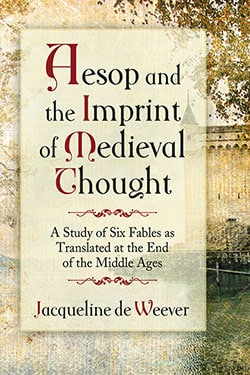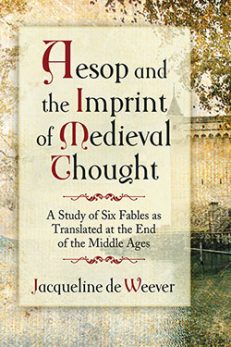Aesop and the Imprint of Medieval Thought
A Study of Six Fables as Translated at the End of the Middle Ages
Original price was: $55.00.$44.99Current price is: $44.99.
In stock
About the Book
This work studies two medieval translations of Aesop’s fables, one in Latin (1497) and one in vernacular Italian (1526), with a close examination of how each translation reflected its audience and its translator. It offers close readings of the “Feast of Tongues” along with six fables common to both texts: “The House Mouse and the Field Mouse,” “The Lion and the Mouse,” “The Nightingale and the Sparrow Hawk,” “The Wolf and the Lamb,” “The Fly and the Ant,” and “The Donkey and the Lap-Dog.” The selected fables highlight imbalances of power, different stations in life, and the central question of “how shall we live?”
About the Author(s)
Bibliographic Details
Jacqueline de Weever
Format: softcover (6 x 9)
Pages: 217
Bibliographic Info: 2 photos, appendix, notes, bibliography, index
Copyright Date: 2011
pISBN: 978-0-7864-5955-1
eISBN: 978-1-4766-0754-2
Imprint: McFarland
Table of Contents
Table of Contents
Preface 1
Introduction: A “Feast of Tongues” 5
One. The Prologue: Voices in the Garden 25
Two. Aggressive Voices: Debate and Flyting 48
Three. Contradictory Voices 72
Four. Interior Voices of Self-Examination 98
Five. The Failed Voice: Art vs. Might 126
Six. The Double Dowry of Multiple Voices 141
Appendix of Texts 151
Chapter Notes 185
Bibliography 201
Index 207
Book Reviews & Awards
“It is de Weever’s obvious enjoyment of the interplay of texts, along with her facility with the languages that make this such a pleasure to read.”—Reference & Research Book News.





